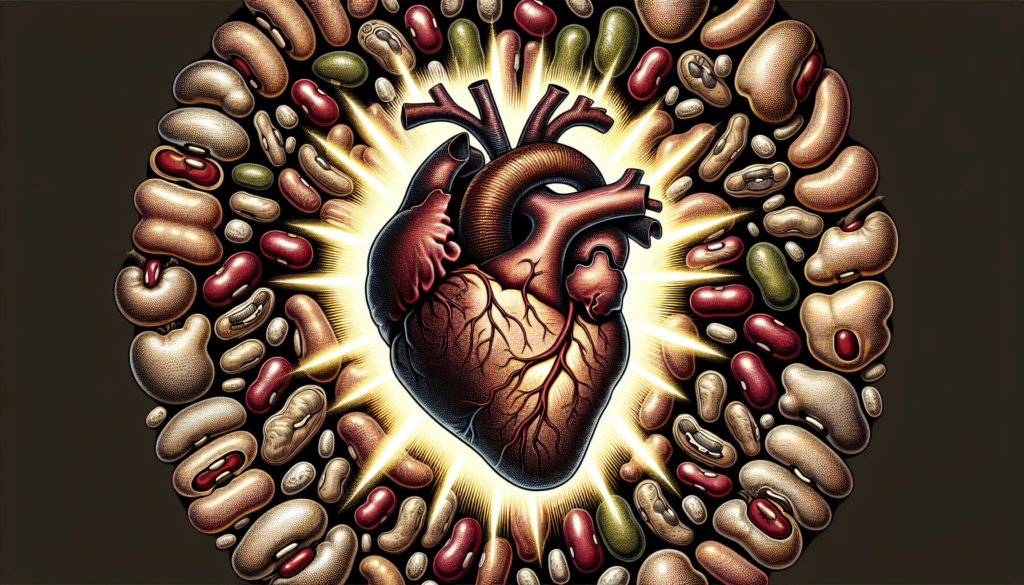In this article, we will explore the significant role that beans play in promoting heart health. Discover the variety of essential nutrients found in beans, such as fiber, antioxidants, and minerals, that make them a heart-healthy addition to your diet. Learn how beans can help lower cholesterol levels, regulate blood pressure, and reduce the risk of heart disease. Get ready to discover the many ways that incorporating beans into your meals can have a positive impact on your cardiovascular well-being.

Beans and Heart Health
Introduction to the benefits of beans
Beans, those humble legumes, pack a powerful punch when it comes to promoting heart health. They have long been recognized as a nutrient-dense food that offers numerous benefits to the cardiovascular system. From reducing cholesterol levels to managing blood pressure and controlling blood sugar, beans are a fantastic addition to any heart-healthy diet. In this article, we will delve into the relationship between beans and heart health, exploring the nutritional value of beans and their various mechanisms for promoting cardiovascular well-being.
Overview of heart health and its importance
Heart health is of utmost importance as it plays a crucial role in our overall well-being. A healthy heart ensures that oxygen and nutrients reach every part of our body, enabling optimal functioning. However, with the prevalence of heart disease on the rise, taking proactive measures to protect our cardiovascular system is essential. Incorporating beans into your diet is one excellent way to support a healthy heart. Their nutritional profile and unique properties make them a powerhouse for cardiovascular health.
Exploring the relationship between beans and heart health
Beans have long been recognized for their heart-healthy properties. Their benefits extend far beyond their high fiber content, as they are also low in fat and cholesterol while being rich in essential vitamins and minerals. Additionally, beans contain plant sterols, peptides, and other compounds that have been shown to positively impact cholesterol levels, blood pressure, blood sugar, and even weight management. Let’s delve deeper into each of these aspects to understand how beans contribute to heart health.
Nutritional Value of Beans
Rich in fiber content
Beans are a fantastic source of dietary fiber, which plays a vital role in promoting heart health. Fiber assists in lowering cholesterol levels, managing blood sugar, and maintaining a healthy weight. By slowing down the absorption of sugar in the bloodstream, fiber helps prevent spikes in blood sugar levels and promotes stable energy levels throughout the day. Additionally, fiber aids in digestion, promoting regular bowel movements and reducing the risk of digestive disorders.
Low in fat and cholesterol
Beans are naturally low in fat and cholesterol, making them an excellent choice for individuals looking to maintain a heart-healthy diet. The absence of saturated and trans fats in beans helps to keep cholesterol levels in check and reduce the risk of heart disease. Unlike animal-based protein sources, which are often high in unhealthy fats, beans offer a lean and nutritious alternative that supports cardiovascular health.
Source of essential vitamins and minerals
In addition to being rich in fiber, beans also provide essential vitamins and minerals that contribute to heart health. They are a good source of potassium, magnesium, and folate. Potassium plays a vital role in maintaining healthy blood pressure levels, while magnesium helps regulate muscle function, including the heart’s proper rhythm. Folate, on the other hand, promotes the production of red blood cells and helps prevent certain types of heart disease.
Reducing Cholesterol Levels
How beans help lower LDL cholesterol
Beans have a remarkable ability to lower LDL (low-density lipoprotein) cholesterol, which is known as the “bad” cholesterol. This is due to their high soluble fiber content. Soluble fiber acts like a sponge, absorbing cholesterol and carrying it out of the body through waste. By reducing LDL cholesterol levels, beans help to prevent the buildup of plaque in the arteries, which can lead to cardiovascular disease.
Providing soluble fiber for cholesterol management
Beans are one of the richest sources of soluble fiber, a type of fiber that dissolves in water. This soluble fiber forms a gel-like substance in the digestive tract, binding to cholesterol and bile acids, preventing their reabsorption into the body. By doing so, soluble fiber helps to decrease total cholesterol levels, particularly LDL cholesterol. Incorporating a variety of beans into your diet can significantly contribute to maintaining healthy cholesterol levels.
Effects of plant sterols in beans on cholesterol levels
Plant sterols, naturally occurring compounds found in beans, have been shown to have cholesterol-lowering effects. These plant compounds have a similar structure to cholesterol, competing with the absorption of dietary cholesterol in the digestive system. As a result, plant sterols can help reduce LDL cholesterol levels and promote a healthier lipid profile overall. Adding beans to your meals is a simple and delicious way to introduce these beneficial plant sterols into your diet.
Managing Blood Pressure
Role of beans in reducing high blood pressure
High blood pressure, also known as hypertension, is a significant risk factor for heart disease and stroke. Fortunately, beans can play a role in managing blood pressure levels. They are low in sodium, a mineral that is often associated with increased blood pressure. By incorporating beans into your diet, you can enjoy a flavorful alternative to high-sodium foods and help maintain healthy blood pressure levels.
Potassium content in beans and its impact on blood pressure
Potassium, abundant in beans, plays a vital role in maintaining healthy blood pressure. This essential mineral helps counteract the harmful effects of sodium, promoting the excretion of excess sodium through urine. By consuming beans regularly, you are providing your body with substantial amounts of potassium, which aids in relaxing blood vessels, reducing tension, and thus lowering blood pressure.
Effect of peptides in beans on blood vessel dilation
Peptides, small proteins found in beans, have been shown to have a positive impact on blood vessel dilation. These peptides act as vasodilators, helping blood vessels relax and widen. This relaxation allows for improved blood flow and reduced pressure on the arterial walls, ultimately resulting in lowered blood pressure. Incorporating beans into your meals can provide a natural way to support proper blood vessel function and maintain a healthy cardiovascular system.

Controlling Blood Sugar Levels
Impact of beans on insulin sensitivity
Insulin sensitivity is a crucial factor in maintaining stable blood sugar levels and preventing the development of type 2 diabetes. Beans have been found to improve insulin sensitivity, helping the body effectively utilize glucose and prevent insulin resistance. By incorporating beans into your diet, you can support your body’s ability to regulate blood sugar levels and reduce the risk of diabetes.
Fiber content in beans and its role in regulating blood sugar
The high fiber content in beans plays a pivotal role in regulating blood sugar levels. Fiber slows down the absorption of carbohydrates, preventing rapid spikes and crashes in blood sugar. This slow digestion also allows for a sustained release of energy, helping to keep blood sugar levels stable throughout the day. For individuals with diabetes or those looking to prevent its onset, beans are an excellent addition to a balanced diet.
Slow release of carbohydrates in beans for stable blood sugar
Carbohydrates in beans are digested slowly due to their high fiber content, resulting in a slow and steady release of glucose into the bloodstream. This gradual release prevents blood sugar levels from spiking and supports a more controlled and stable energy supply. By consuming beans regularly, you can maintain stable blood sugar levels, reduce the risk of insulin resistance, and promote overall metabolic health.
Preventing Obesity
Role of beans in weight management
Beans are a valuable tool in weight management due to their high fiber content and low calorie density. The fiber in beans adds bulk to meals, leaving you feeling fuller for longer and reducing the likelihood of overeating. Additionally, beans are relatively low in calories, making them an ideal food for individuals looking to maintain a healthy weight or shed extra pounds. Their nutrient density contributes to satiety, making you feel satisfied without consuming excessive calories.
Feeling full and satisfied with high fiber content in beans
The high fiber content in beans helps to create a feeling of fullness and satisfaction after a meal. Fiber absorbs water in the digestive tract, expanding and promoting a sense of satiety. By including beans in your meals, you can curb your appetite, reduce the likelihood of unnecessary snacking, and manage your caloric intake more effectively.
Effect of resistant starch in beans on calorie absorption
Beans contain resistant starch, a type of starch that resists digestion in the small intestine and reaches the large intestine intact. In the large intestine, resistant starch serves as food for beneficial gut bacteria, promoting a healthy gut microbiome. The fermentation process of resistant starch produces short-chain fatty acids, which are believed to aid in weight management by reducing the absorption of calories from other foods. Including beans in your diet can contribute to a healthy weight and support overall well-being.
Antioxidant and Anti-inflammatory properties
Exploring the presence of antioxidants in beans
Beans are rich in antioxidants, substances that help protect the body from oxidative stress caused by harmful molecules known as free radicals. These antioxidants, such as flavonoids and polyphenols, scavenge free radicals and prevent them from causing damage to cells. By consuming beans regularly, you can enjoy the benefits of these antioxidants, which have been associated with a reduced risk of heart disease and other chronic conditions.
Protecting the heart from oxidative stress
Oxidative stress can lead to inflammation and damage to blood vessels, increasing the risk of heart disease. The antioxidants found in beans help neutralize free radicals, ultimately reducing oxidative stress and protecting the heart from damage. Including a variety of beans in your diet provides your body with a diverse range of antioxidants, boosting your heart’s defense against oxidative stress.
Anti-inflammatory effects of certain compounds in beans
Chronic inflammation is a contributing factor to many diseases, including heart disease. Certain compounds found in beans, such as phytochemicals and flavonoids, possess anti-inflammatory properties. These compounds can help reduce inflammation in the body, particularly in the blood vessels, ultimately promoting cardiovascular health. By incorporating beans into your diet, you can benefit from their anti-inflammatory effects and potentially lower the risk of heart disease.
Cooking and Incorporating Beans into Diet
Different varieties of beans and their preparation methods
Beans come in a wide variety of types, including black beans, chickpeas, kidney beans, lentils, and pinto beans, just to name a few. Each variety has its unique flavor profile, texture, and nutritional composition. Whether you prefer creamy white beans in a hearty soup or the earthy taste of black beans in a vibrant salad, there is a type of bean to suit every palate. Fortunately, beans are incredibly versatile and can be prepared in various ways, including boiling, pressure cooking, and slow cooking. Experiment with different cooking methods to find your favorite way to enjoy these nutritional powerhouses.
Incorporating beans into meals for heart-healthy recipes
Adding beans to your meals is a simple and flavorful way to enhance the nutritional value of your dishes. They can be a star ingredient or a complementary addition, depending on the recipe. Consider including beans in salads, soups, stews, wraps, and even baked goods. Their versatility allows for endless culinary possibilities while providing a heart-healthy boost to your meals.
Tips and tricks for cooking beans to preserve nutritional value
To maximize the nutritional value of beans, there are a few tips and tricks to keep in mind. Soaking beans overnight before cooking helps reduce cooking time and enhances their digestibility. If time is limited, canned beans are a convenient option; just be sure to rinse them thoroughly to reduce sodium content. When cooking beans, avoid overcooking to preserve their texture and prevent nutrient loss. Remember to add herbs, spices, and other flavor-enhancing ingredients to enhance the taste of your beans and create delicious and nutritious meals.
Other Health Benefits of Beans
Enhancing digestive health with beans’ high fiber content
In addition to their impact on heart health, beans are a boon for digestive health. Their high fiber content promotes regular bowel movements, preventing constipation and supporting a healthy digestive system. By including beans in your diet, you can foster a diverse and thriving gut microbiome, which plays a crucial role in overall well-being.
Boosting overall cardiovascular health with regular bean consumption
Regular consumption of beans has been associated with improved cardiovascular health. The combination of fiber, antioxidants, plant sterols, and other beneficial compounds found in beans work synergistically to support a healthy heart and reduce the risk of heart disease. By making beans a part of your regular diet, you can contribute to your overall cardiovascular well-being.
Potential benefits of beans in preventing other chronic diseases
The positive effects of beans on heart health extend beyond cardiovascular well-being. Studies have suggested that including beans in your diet may also have protective effects against other chronic diseases, such as type 2 diabetes, certain types of cancer, and obesity. While further research is needed to fully understand these potential benefits, incorporating beans into a well-rounded diet is a simple and delicious way to support your long-term health.
Conclusion
Summary of the positive effects of beans on heart health
In conclusion, beans offer incredible benefits for heart health. Their rich fiber content helps lower cholesterol levels, manage blood pressure, control blood sugar, and support weight management. The various nutrients, such as potassium, magnesium, and folate, found in beans contribute to overall cardiovascular health. Additionally, beans’ antioxidant and anti-inflammatory properties protect the heart from oxidative stress and chronic inflammation. By cooking and incorporating beans into your diet, you can enjoy the numerous health advantages that these legumes offer.
Encouragement to include beans in a balanced and heart-healthy diet
It’s time to embrace beans as a staple in your diet. From the fiber-packed black beans in a burrito to the comforting lentil soup on a chilly evening, there are endless possibilities to enjoy the culinary delights of beans. Including a variety of beans in your meals will not only add flavor and texture but also provide your body with essential nutrients and promote heart health. So go ahead, experiment with different bean recipes, and discover the joy of nourishing your heart through the power of beans.
Final thoughts on the significance of beans for overall well-being
The significance of beans extends far beyond their impact on heart health. These nutrient-dense legumes offer an array of health benefits, supporting digestion, weight management, and even potentially preventing other chronic diseases. Their versatility in the kitchen makes them an accessible and affordable option for every individual seeking to improve their overall well-being. So, let beans become your heart’s best friend, and embark on a journey of health, one delicious meal at a time.
